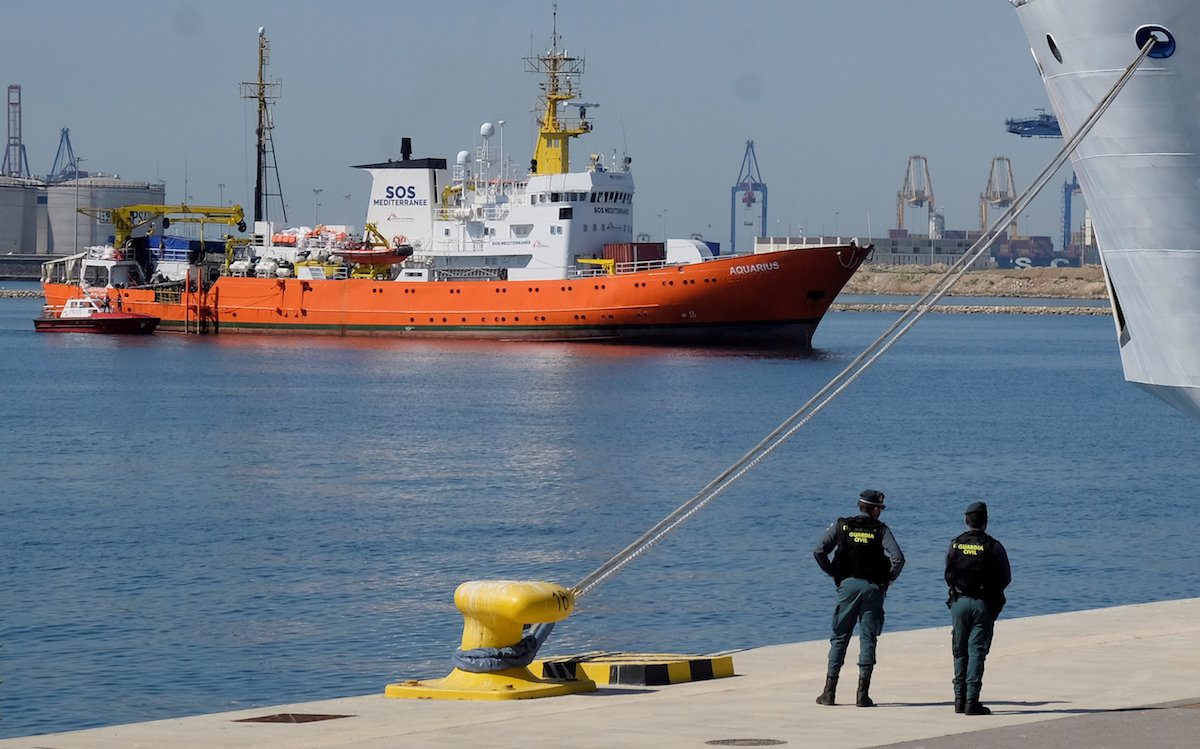The Aquarius rescue ship arrives to port carrying 106 migrants in Valencia, Spain June 17, 2018. REUTERS/Heino Kalis
 By Steve Scherer ROME, Oct 1 (Reuters) – Italy’s closing of its ports to rescued migrants is driving up deaths at sea, an Italian think tank said on Monday, using calculations based on numbers collected by U.N. agencies.
By Steve Scherer ROME, Oct 1 (Reuters) – Italy’s closing of its ports to rescued migrants is driving up deaths at sea, an Italian think tank said on Monday, using calculations based on numbers collected by U.N. agencies.
Since taking power in June, Interior Minister Matteo Salvini, who heads the far-right League party, has refused to allow charity rescue ships to dock in Italy, a policy that has broad popular support after the arrival of almost 650,000 people from North Africa since 2014.
Though arrivals are down 80 percent from last year, Salvini’s hardline on immigration has helped more than double support for his party since the March national election.
But International Organization for Migration (IOM) estimates of the number of dead or missing at sea suggest there are dire consequences to this policy, according to Matteo Villa, a researcher at Italy’s ISPI think tank.
In the four months since Salvini took power, the average number of deaths per day has risen to 8, compared with 3.2 in the period between July 16, 2017 nd May 31, 2018, when the previous government was in charge, Villa’s calculations show.
The death rate in September was 19 percent, so about one in five migrants who attempted to reach Italy from North Africa perished. That’s the highest monthly death rate recorded since at least 2012, when reliable data began to be collected, Villa said.
“These data show there’s a problem,” Villa told Reuters, adding that the lack of civilian ships at sea also likely means recent estimates of dead are too low because there are no witnesses.
There currently are no civilian charity ships patrolling the waters off of Libya after the latest standoff on the high seas, which involved the Aquarius rescue vessel, ending on Sunday.
In response to the report, a source close to Salvini told Reuters that the minister’s objective is to stop departures altogether, and the presence of the charity ships had caused people smugglers to send migrants on less safe boats.
“The objective is to bring real refugees to Europe by plane instead of these journeys of hope,” the source said.
“The presence of non-governmental groups close to the Libyan coasts has led smugglers to use smaller and less secure boats to cover just a few miles, hoping that the migrants are picked up by the NGOs. In this way, the risk for migrants increased, and traffickers increased profits,” the source said.
NGOs have repeatedly denied helping or having any ties whatsoever to traffickers.
On Monday in Geneva, U.N. High Commissioner for Refugees Filippo Grandi repeated a call for more rescuers at sea.
“Rescue at sea – a marker of our shared humanity – has been taken hostage by politics,” Grandi said. (Additional reporting by Stephanie Nebehay in Geneva, Editing by William Maclean)
(c) Copyright Thomson Reuters 2018.

 Join The Club
Join The Club











